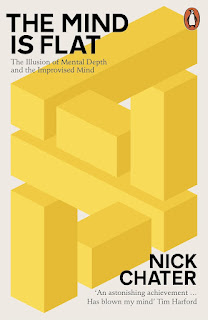Training is post-rationalisation
For me, he explains why most training is post-rationalisation, simplistic stories we tell ourselves about cognition. We latch on to abstract words like creativity, critical thinking and resilience then wrap them up in PowerPoints to create coherent stories that are quite simply fictions. This is why they are so ineffective in the real world. They make you think there are easy solutions, simple bromides for action, when there are not. He thinks this is all wrong and I think he is right
Cognition is improvisational
Chater supports his arguments fully by discussing various psychological studies and experiments. He proposes that our thoughts, feelings, and behaviours are largely improvisational and context-dependent. According to his theory, our responses to situations are not driven by inner beliefs or desires, but are rather ad-hoc constructions created on the spot. This idea challenges the traditional views of psychology and suggests that much of what we believe about our internal thought processes might be an illusion.
Attacks psychoanalytic and psychotherapeutic worlds
It is a direct attack on the whole psychoanalytic and psychotherapeutic world and if true, renders much of what passes for psychology as speculative rot. He challenges the whole notion of a complex, subconscious mind that can be unlocked or understood through psychoanalysis or similar therapeutic methods. Since our thoughts and behaviours are improvised on the surface level and are context-dependent, delving into the supposed depths of the subconscious to find hidden meanings or repressed memories, as is often the goal in psychoanalysis, is likely to be misguided. He suggests that the mind doesn't work in the way psychoanalysis proposes, with its emphasis on uncovering deep-seated, unconscious desires and motivations.Over-rationalise
We over-rationalise when it comes to ideas about the brain, when it is fantastically complex and opaque. He touches upon Tolstoy, where Anna Karenina commits suicide – but why? The stories we tell ourselves about her motivations are, for Chater, quite wrong, as she would be incoherent about such things. Rationalism is the mistake here, the idea that there is a true answer for everything. Dennett has taken a similar position, where conscious rationalisation is always retrospective, delving back in to the brain. The brain does huge, complex, parallel computations and has no locus or simplistic causes, the same applies to LLMs, there is no pace you can point to for the production of an answer. The brain, like a LLM, is necessarily opaque.
Stories are misleading
We are improvisors and this is where our 'storied-self' is misleading. We simply make most things up and use simple and approximate models to get through our lives. These simulations are often crude. Geoffrey Hinton in 1979 talks about the shallowness of human inference, using imagined cubes as an example. Our simulations of the world are momentary and not wholly coherent. We build models of it (the cone of experience) trying to see it as consistent. In fact, we deal with very localised bits of the world, a sliver of reality. We can’t model the world in our brains as the world is much larger than us! It is all a matter of approximation, analogy and past experience.
We latch onto abstract models and essences but these are far too reductive. Human exceptionalism is a good example of this, with words like ‘creativity’ and in general 21st century skills. Chater thinks these are misleading terms as they are too abstract and exclude the complexity of actual cases. He and Wittgenstein are, I think, correct on this. Language is promiscuous and tends to over produce abstractions which we think are real but turn out to be just that – misleading abstractions.
Our sense of our own psychology is almost completely wrong, as we have incredibly limited perception of the world through our senses and our minds work very differently from how they think they work. Colour is unlikely to be essential out there in the world, as they are mental constructions, similarly with temperature, as experienced.
Bayesian brains?
One could argue that there are fundamental models, like pure reason, mathematics and science – axiomisation does happen, often after huge amounts of effort, but very few things are, in practice, axiomised. We may have some of this axiomised knowledge in us but this is unlikely to be foundational in the way psychology or neuroscience thinks it is.As they say - all models are wrong but some are useful. We can, for example, hypothesise about the brain being a Bayesian organ. This may be true but more likely to use things similar to Bayesian approaches to cognition. Tom Griffiths and Josh Tanenbaum follow this line but Chater thinks this is very localised and not sufficient for most cognition.
Conclusion
It has been a while since I read anything that so reversed my long-held beliefs. Heavily influenced by my reading and work in AI I had been coming to a similar, but ill-informed and badly-evidenced belief that this was indeed the case. It changes your whole perspective on cognition and behaviour. AI is showing us that much of what passes for human behaviours can be reproduced to a degree by LLMs and other forms of AI. This should not be so astonishing, if Chater is right, that we are quite shallow thinkers.



No comments:
Post a Comment